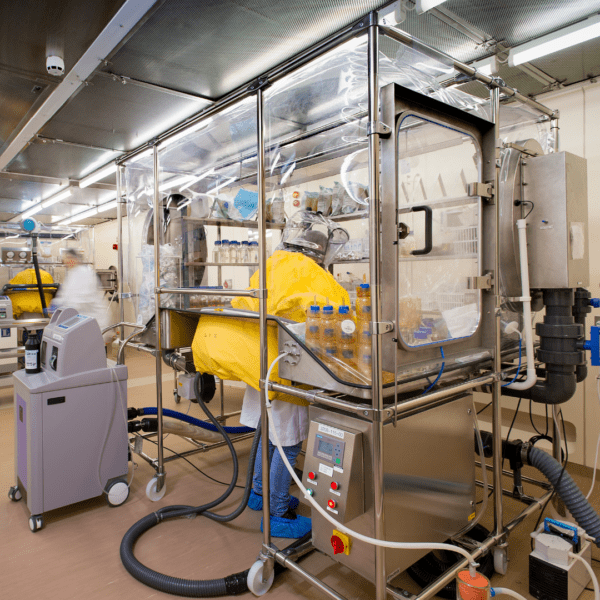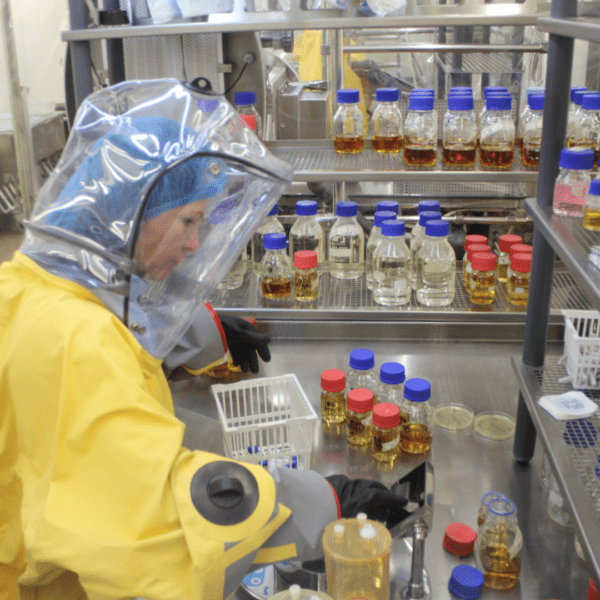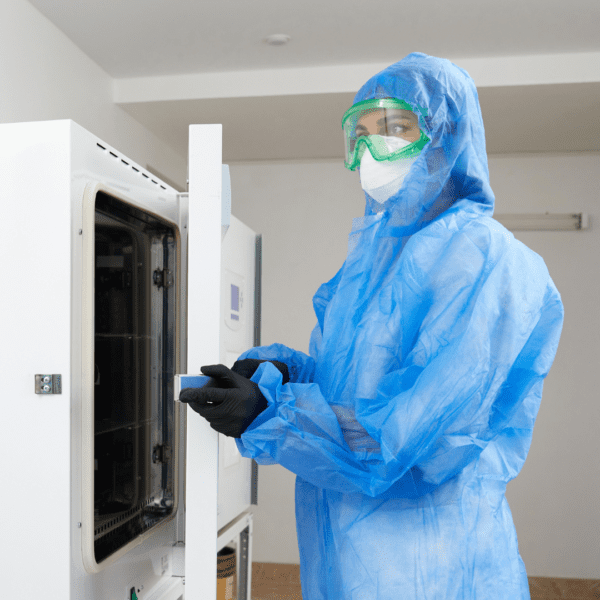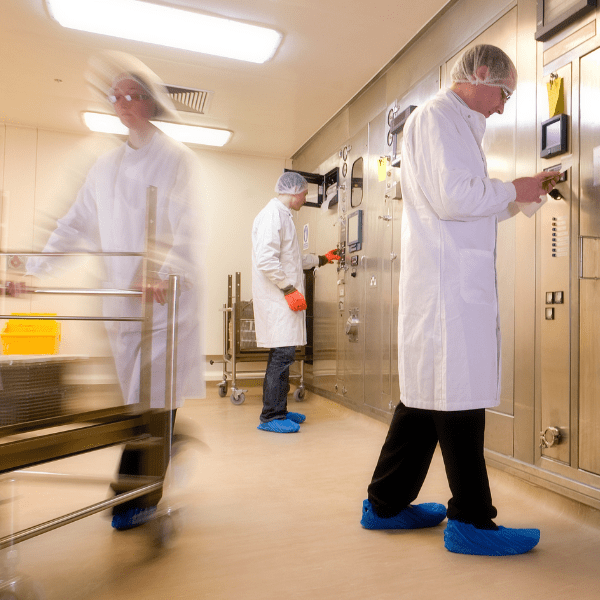Sterility Testing For Medical Devices & Pharmaceuticals
Sterility testing at Cormica meets global standards, including ISO 11737-2, USP <71>, Ph. Eur. 2.6.1, and JP XVIII 4.06, ensuring reliable and compliant results.
We utilise comprehensive and precise methodologies to ensure that medical devices and pharmaceutical products are free from contaminating microorganisms.
Our key sterility testing methods include: Direct Inoculation & Membrane Filtration (SteritestTM and open funnel filtration).
Our facilities operate an (ISO class 7 compliant cleanroom, which offer a number of large capacity half-suit isolators which enables us to conduct testing on a multitude of different medical devices, combination products, pharmaceuticals and presentations.
Our isolators are sanitised with a high-efficiency vapour process to maintain the highest integrity of the test environment.

Testing The Sterility of your Medical Devices and Pharmaceuticals
Direct Inoculation: This method is for samples which are unable to be filtered through a filter membrane with a pore size of 0.45 µm. This method involves transferring the product directly into two types of culture media: Tryptic Soy Broth (TSB) for detecting fungi and aerobic bacteria, and Fluid Thioglycollate Medium (FTM) for anaerobic bacteria. The samples are incubated at appropriate temperatures for 14 days. Any turbidity or change in the media may microbial growth, which signifies contamination.
Membrane Filtration: Ideal for parenterals, ophthalmic solutions, and other aqueous products that can be filtered. WML provide two types of membrane filtration. Traditional open funnel and steritestTM. The product is passed through a sterile membrane filter with a pore size of 0.45 µm, which traps any contaminating microorganisms that may be present within the product. The filter is contained within the appropriate growth medium ( TSB and FTM) and is incubated temperatures for 14 days to detect any microbial contamination. This method is particularly useful for products with antimicrobial properties as appropriate washing steps are performed to eliminate any antimicrobial properties present.
Method Suitability Testing: To ensure the chosen method works effectively with the specific product, WML perform method suitability testing for both Direct Inoculation and membrane filtration methods. The purpose of this test is to determine if aerobic and anaerobic organisms will grow in the test after antimicrobial agents have been neutralised. It is recommended the Method Suitability Test is carried out for all products tested.

Medical Products that Require Rigorous Sterility Testing:
- Pharmaceuticals (e.g., Injectables, Ophthalmic solutions)
- Medical devices (e.g., Surgical instruments, Implants)
- Combination Products (Pre-filled syringes, Autoinjectors, Inhalers)
- Biologics (e.g., vaccines, cell therapies)
- Parenteral products
- Ophthalmic preparations
- Catheters and IV sets
- Wound dressings
- Dialysis solutions
- Transdermal patches
- Stents and other implantable devices
60+ Years of Sterility & Microbiological Testing
Located on the South Coast in Gosport, UK, our laboratory stands as one of the largest GMP/GLP microbiology and sterility testing facilities in the UK. Established in 1962, we have over 60 years of experience in delivering trusted, high-quality sterility testing services. By choosing our laboratory, you gain access to decades of proven expertise, cutting-edge testing methods, and a dedicated team committed to ensuring the safety and compliance of your products.

Medical Device Sterility Regulatory Compliance
Cormica adhere to all relevant regulatory standards, including ISO 11737-2, USP <71>, Ph. Eur. 2.61., JP XVIII 4.06. This compliance ensures our testing meets the stringent requirements of regulatory bodies for our clients’ products.
ISO 11737-2:
This international standard specifies the requirements for sterility testing of medical devices. It provides guidelines for the preparation, testing, and interpretation of sterility test results, ensuring that medical devices are free from contaminating microorganisms.
USP <71>, Ph. Eur. 2.6.1, JP XVIII 4.06:
The three harmonised pharmacopeia guidelines for sterility testing of pharmaceutical preparationsand biologics outline the procedures and acceptance criteria for sterility testing. This ensures that products are free from viable microorganisms and safe for use.

Why You Need to Perform Sterility Testing
Sterility testing is crucial for confirming that medical devices and pharmaceutical products are free from harmful microorganisms. It ensures:
Patient Safety:
Sterile products prevent infections and complications arising from microbial contamination. This is particularly important for injectable products, surgical instruments, and other medical devices used in invasive procedures.
Product Efficacy:
Sterile products maintain their therapeutic effectiveness by ensuring they are free from contaminants that could compromise their intended use. This is essential for pharmaceuticals, biologics, and medical devices.
Regulatory Approval:
Sterility testing meets regulatory requirements, facilitating product approval and market access. Regulatory bodies mandate sterility testing to ensure product safety and efficacy.
Sterility Testing Frequently Asked Questions (FAQs)
What is the turnaround time for sterility testing?
Traditional sterility testing typically takes 14 days to complete. This includes the time required for incubation and observation for any signs of microbial growth. We offer expedited testing services to meet urgent needs.
What types of products require sterility testing?
Sterility testing is required for a wide range of products, including pharmaceuticals (such as injectables and ophthalmic solutions), medical devices (such as surgical instruments and implants), and biologics (such as vaccines and cell therapies).
How do you ensure the accuracy of sterility tests?
Cormica follows stringent protocols and use validated methods to ensure the accuracy of sterility testing. Our tests are performed in half suit isolators, which provide a controlled and sterile environment to minimize contamination. Additionally, we implement rigorous quality control measures and continuous monitoring to ensure reliable results.
What happens if a product fails sterility testing?
If a product fails sterility testing, it triggers a thorough out of specification investigation to identify the source of contamination. The result will be a failure if no root cause can be identified.
Are there any limitations to sterility testing?
Sterility testing is carried out on a select few containers from an entire batch. The sterility test itself confirms the containers tested are free from any contaminating microorganisms. The Ph.Eur 2.6.1 states that ‘ a satisfactory result only indicates that no contaminating micro-organisms were found in the conditions of the test.
What are the risks of non-compliance with sterility testing standards?
Non-compliance can lead to:
- Patient safety risks: Increased chances of infections, adverse reactions, or fatalities from contaminated products.
- Legal repercussions: Fines, legal liabilities, and potential litigation.
- Product recalls: Financial losses, brand damage, and disrupted supply chains.
- Market delays: Delayed product launches and missed revenue opportunities.
Compliance ensures patient safety, regulatory approval, and business continuity.


